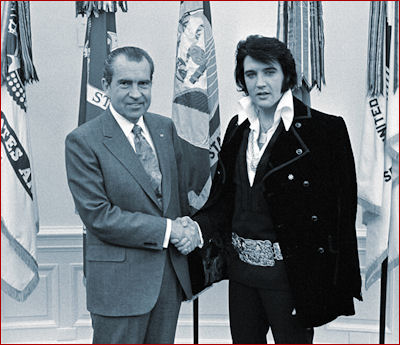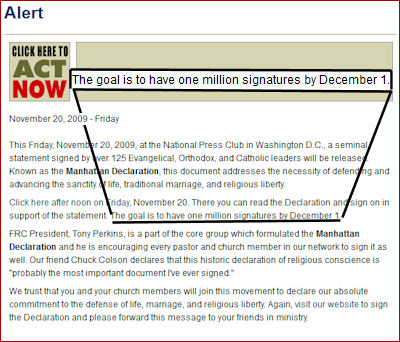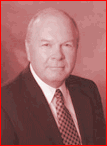by Phil Johnson
 o (in case you hadn't heard) Rick Warren will headline the list of speakers at next October's Desiring God Conference.
o (in case you hadn't heard) Rick Warren will headline the list of speakers at next October's Desiring God Conference.

Of course I think it's a bad turn of events, and I didn't find
Dr. Piper's rationale for handing his platform over to Warren satisfying at all. I was surprised when I heard about it, but on second thought, I have to admit that it is consistent with Dr. Piper's
modus operandi. Last year
some people were appalled, others delighted, when Doug Wilson spoke at the conference. The year before that,
the blogosphere was all abuzz with strong passions for months because Mark Driscoll would be the featured speaker. In 2007, it was John MacArthur, who (let's face it)
is hardly a John Piper clone.
So Piper likes to feature speakers from outside the boundaries of his own circle of close fellowship, and that's a
good thing, within limits. But Piper's choice of Warren as a keynote speaker proves his idea of where those limits lie is vastly—perhaps
fundamentally—different from mine.
Furthermore, as much as I differ from Piper on the question of who deserves his imprimatur, there's at least an equal measure of difference between what I think is the
proper way to respond to Piper and the way some of his most vocal critics
have responded. I'm appalled and ashamed at how some on my side of this debate have expressed their disagreement with Dr. Piper.
It seems to me the whole controversy reflects in microcosm why the evangelical and fundamentalist movements of the 20th century have both failed so egregiously.
Let me explain why. Here are some observations about John Piper, Rick Warren, the critics, and the biblical duty of separation—separation both from false teachers (Romans 16:17; 1 Corinthians 16:22; Galatians 1:8-9; 2 John 7-11), and from deliberately, incorrigibly disobedient brethren (2 Thessalonians 3:14-15; 1 Corinthians 5:11).
John Piper
I love John Piper. People often ask me what living preachers I listen to besides John MacArthur. John Piper is my clear first choice. He's also one of my favorite authors.
The Justification of God: An Exegetical and Theological Study of Romans 9:1-23 was the first John Piper work I ever read, and I was hooked. His chapter in
Still Sovereign by Thomas Schreiner and Bruce Ware is worth the price of the whole book. The chapter is titled
"Are There Two Wills in God?" and if more Calvinists would read that chapter and digest its contents, it would settle most of the interminable debates about the optative language Scripture uses to speak of God's "desire" for the repentance of reprobate people. I have written
elsewhere about how deeply I appreciate Piper's
The Future of Justification. His
Don't Waste Your Life is as profound as it is brief and pithy. I've never read any book by Piper that I would give a negative review to. I've never listened to a sermon by him without being impacted by the power of truth.
Furthermore, I greatly respect and appreciate Dr. Piper for his courage and persistence as a defender of the faith against Open Theism, not to mention his diligent defense of biblical authority against the juggernaut of egalitarianism. He's one of the most bold and large-hearted preachers alive today. For those and many other reasons, my appreciation of Dr. Piper runs deep.
Obviously, though, I disagree with him on some fairly important issues, mostly related to his belief that the charismatic gifts are still fully operative. It is this facet of Dr. Piper's theology, I think, that makes his judgments often seem subjective—even arbitrary. Consider, for example, his fascination with "holy laughter" at the height of the Toronto Blessing—and his persistent reluctance to condemn that movement despite the vast damage it was causing. (Did he ever actually denounce the Toronto phenomenon? I didn't hear about it if he did.) That is just one example of what I would regard as a glaring lack of discernment in some of his judgments.
Holy passion and sacred delight in God are wonderful virtues, of course, and these constitute the centerpiece of Dr. Piper's message. But true delight in God is the polar opposite of
hedonism, and copious passion
per se is not necessarily righteous. (Nor is a quiet or restrained expression of one's feelings a sign of indifference.) As a matter of fact, ungodly passions are a massive problem in the church today, especially in the charismatic fringe. I wish Dr. Piper were more vocal in warning against
that kind of imbalance.
Furthermore, human passion and biblical discernment can be like oil and water—a truth Dr. Piper
acknowledges in principle. Unbridled passion and feelings-based judgments are deadly to discernment. Hang onto that thought, because it will come up again later in this post. It's a principle that works both ways.
Rick Warren
I can't think of anyone who would make a finer poster-boy for the pragmatic, spiritually impoverished, gospel-deprived message of modern and postmodern evangelicalism than Rick Warren. He is shallow, pragmatic, and chameleonic. He is a spiritual changeling who will say whatever his audience wants to hear. He wants desperately to be liked and accepted by Muslims, evangelicals, and everyone in between. The length to which he will go to indulge his ecumenical bent is seen in the fact that he was one of a handful of professing evangelicals who signed
"A Common Word Between Us and You," a declaration of spiritual accord between Muslims and Christians.
His church's Easter service at Angel Stadium last week was headlined by the Jonas Brothers (who sang a love song from a Disney movie as if it were a song of praise to God). And Warren's sermon on the resurrection was a paean to Possibility Thinking—assuring people that God wanted to do a miracle to revive their broken dreams. That, Warren said, is the meaning of the resurrection. (And, "Remember, God isn't mad
at you, He's mad
about you.")
Warren has
squandered too many opportunities to proclaim the gospel accurately and
muffed too many questions on national television to be given a platform by one of the leading figures of Together for the
Gospel, The
Gospel Coalition, and similar movements whose central goal, after all, is to undo the damage Warren's philosophy has caused in the evangelical movement.
The massive problems with Warren's ministry philosophy are
well documented. The same with his practice of softening, omitting, or denying key gospel truths about sin, judgment, the wrath of God, and the necessity of repentance. A preacher doesn't have to affirm heresy or overtly deny truth in order to be dangerous. It is entirely possible by one's behavior to distort or obscure the gospel message. All Peter did to earn a public rebuke from Paul was change seats at the dinner table (Galatians 2:11-14). But in context, that seriously compromised the gospel.
Deliberately and repeatedly giving short shrift to the greatest truths of the gospel is at least as serious an error as Peter's hypocrisy.
Warren's private reassurances to John Piper shouldn't trump the fact that he does not actually preach the gospel plainly, boldly, thoroughly, unashamedly, and in a way that is faithful to the Word of God. If he privately believes something other than what he has said in his books and sermons, that makes him
more culpable as a hypocrite.
His belief is better than his practice? Let's not make that sound heroic.
On one level I share Dr. Piper's curiosity. I'd love to hear Rick Warren explain how someone who believes what he professes to believe could possibly justify the pragmatic philosophy of ministry he has been championing for thirty years. But that's something I'd prefer to hear in private. I would never give such a man a platform at a national conference, in front of thousands of impressionable disciples, to make an
apologia for his pragmatic ministry philosophy or his truncated gospel.
In fact, it pains me deeply to see Dr. Piper himself making such an
apologia for Warren, assuring viewers (without any substantiation other than their private conversation) that Warren is "deeply theological," and "at root . . . doctrinal and sound." Jesus said, "Either make the tree good and its fruit good, or make the tree bad and its fruit bad, for the tree is known by its fruit" (Matthew 12:33). That's fitting advice for a situation like this.
No matter how Dr. Piper may qualify his endorsement of Rick Warren (and he didn't seem to be qualifying it very much in
the live Q&A the other night), many of Dr. Piper's admirers
do assume Warren now has Piper's full imprimatur. Some of the dialogue in various online forums and social-networking sites demonstrates that.
The critics

Speaking of Twitter chatter and Facebook feedback, I can't touch on this whole subject without pointing out that the tone of some of the criticism leveled at Dr. Piper is simply revolting. Within fifteen minutes of Dr. Piper's live webcast the other night, I had to delete a comment on my Facebook page from a woman who called him a clown. Over the past week I have deleted an average of two or three comments each day that were personally insulting or deliberately disrespectful toward Dr. Piper. One woman expressed a hope that his sabbatical would be permanent.
It intrigues and disturbs me that most (not all, but
most) of the overtly impertinent comments have come from women. There's evidently a growing regiment of self-appointed discernment experts consisting of women who give lip service to the authority of Scripture. They would unanimously affirm that Scripture reserves for men the teaching and ruling elders' roles in the church. They would, I presume, deplore the ordination of women to such positions of authority. They are not offended by Paul's statement in 1 Timothy 2:12; rather, they would
say amen to it. And yet in practice they have no compunction about posting angry, loud condemnations and insistent demands for the removal of a pastor of John Piper's stature. These things ought not to be.
Anyway, I remarked on the radio this week that I think a lot of Dr. Piper's critics have been too shrill, too hysterical, too trigger-happy, too eager for immediate reprisals, and too disrespectful to Dr. Piper. The reactions to that comment have been chilling. I wonder if some of Dr. Piper's critics would have been happier if I had called for his deportation to Siberia. One blog (wholly written, evidently, on a keyboard with a defective shift key) labeled my position "LUKEWARM," claiming I was trying to stay "SAFELY IN THE MIDDLE AS TO NOT ISSUE ANY DECISION WHATEVER." A woman who relentlessly tried to pick a fight with me on my Facebook page finally took her beef to Twitter, where she complained that I was determined to stifle her passion.
Well, as I said above, some passions
need to be stifled, and raw passion is a detriment, not an aid, to true discernment.
I've made the argument many times that sharp words and sarcasm aren't
always inappropriate, but they are
certainly inappropriate as a first response to a man of Dr. Piper's stature. No wonder the self-styled "discernment" community is so odious to milder-tempered Christians.
Separation
It was, however, Dr. Piper himself, not his critics, who first raised the specter of separation. He mentioned the subject twice in his
apologia for Warren. First, he said one of the reasons he invites occasional bad-boy types to speak at his conferences is that he hopes the Young, Restless, Reformed movement will not imitate the overzealous separatism of the twentieth-century fundamentalist movement.
I agree that this would be a bad thing, but seriously: Does that really look like it's a looming danger?
The answer to hyper-separatism is not
no separatism at all.

That, of course, was the error of neo-evangelicalism, a movement closer to Dr. Piper's own roots. Neo-evangelicalism reacted to the extreme militancy of certain angry fundamentalists by repudiating separatism altogether. That philosophy (for which
Christianity Today and the National Association of Evangelicals were tireless cheerleaders) steadily and systematically moved the boundaries of the evangelical movement further and further out, until there were effectively no boundaries at all. The mainstream of the movement abandoned its own principles. The movement traded the gospel for shallow political goals. A man of Ted Haggard's weak character and loose doctrine rose to the highest position of leadership. Good feelings and friendly relations eventually trumped almost every evangelical truth. Finally, the emerging generation began to trade the pragmatism and shallowness of their evangelical parents for a postmodernized brand of religion that at least offered the illusion of more depth and tradition.
Together for the Gospel, The Gospel Coalition, and the so-called Young, Restless, Reformed resurgence of Calvinism all gained their strength chiefly because they effectively answered the trends that had been spawned by evangelicalism's attempts to broaden its base by becoming more and more inclusive. A return to that practice will in very short order utterly nullify any gains those movements have made.
The fact is, Scripture commands faithful Christians to confront, rebuke, and correct those who twist or reinvent the gospel—not to ask them to speak at our most important conferences. If they fail to amend their errors (as Rick Warren has consistently done), there comes a time when separation is mandatory. The neglect of that duty (and in many cases, a
refusal to comply) has destroyed countless churches and evangelical institutions, not to mention the broad evangelical movement itself. Let's bear that in mind.
Dr. Piper also raised the issue of "secondary separation" near the conclusion of his remarks about Rick Warren. The fact that he brought the issue up at all demonstrates that he knew his invitation to Warren would be divisive. That's another reason I'm very sorry and disappointed that he made this choice—especially if (as it seems) he extended the invitation to Warren during his first conversation with him, without seeking counsel or affirmation from others (especially his partners in T4G and TGC).
But Dr. Piper's friendship with Rick Warren doesn't instantly and automatically make Dr. Piper an enemy of the faith. People have already called for a boycott of his books, reprisals against those who are perceived as "LUKEWARM" in their response to Piper, and practically everything short of assassination. In their minds, those who balk at the cry for some kind of nuclear strike against Piper are guilty of utter apathy and inaction.
That's a ridiculous point of view.
So is the opinion that
no response whatsoever is actually the best possible response. Piper influences people who are under my pastoral care. It would be unconscionable for me to ignore what I am convinced is a dangerously misleading and potentially hurtful decision. But there are several valid, biblical responses that lie between the extremes of sheer apathy and shrill vigilantism. The best option, in a case like this, is to explain as carefully as possible why I disagree with Dr. Piper's decision, plead with Dr. Piper to reconsider the trajectory he has set, and do everything possible to make the boundaries between the gospel and all other messages as clear as possible. If Dr. Piper continues on this trajectory of ever-broadening boundaries, the time may come when his influence would become such a danger that total separation from him would be necessary. I frankly don't envision that, given Dr. Piper's passion for the gospel. But more shocking things have happened.
Meanwhile, I'm not obliged to invite Dr. Piper to speak to
my flock in order to prove that I'm not practicing secondary separation. Without utterly anathematizing him, I can certainly temper my enthusiasm in recommending his teaching to impressionable people. I
do still have a duty to regard him as a brother rather than an enemy or an apostate (cf. 2 Thessalonians 3:15), and I owe him respect and honor as one to whom those things are due (Romans 13:7).
From my perspective it looks like Dr. Piper is repeating the worst errors of the neo-evangelicals, and his critics are imitating the worst misconduct of the hyper-fundamentalists. I find myself in unfamiliar territory—in the middle—pleading for more restraint, more
biblical discernment, less raw passion, and less impulsive behavior on both sides.
I'll see you at
T4G next week.
See also:


 hy are front-row evangelical leaders so enthralled with drafting formal statements and grandiose-sounding declarations? Virtually every year since the release of the first "Evangelicals and Catholics Together" statement in 1994, some group or another (usually consisting of self-appointed "evangelical" strategists and Christianity Today contributing editors) gets together to repudiate evangelical principles and discuss post-evangelical strategies—while pretentiously laying claim to leadership in the amorphous evangelical movement.
hy are front-row evangelical leaders so enthralled with drafting formal statements and grandiose-sounding declarations? Virtually every year since the release of the first "Evangelicals and Catholics Together" statement in 1994, some group or another (usually consisting of self-appointed "evangelical" strategists and Christianity Today contributing editors) gets together to repudiate evangelical principles and discuss post-evangelical strategies—while pretentiously laying claim to leadership in the amorphous evangelical movement.


 The epitome of this, once again, is Charles Colson, a politically shrewd, worldly-wise, fully-educated, well-spoken man who nevertheless manages to sound stunningly clueless at times. For example, he claims to believe the Manhattan Declaration failed because people who are apathetic about doctrine were afraid of it. Anyone who paid attention knows the precise opposite is true. Those most outspoken voices against the Manhattan Declaration were conservative evangelicals who insist on being far more precise in their doctrine than the drafters of that manifesto want evangelicals to be.
The epitome of this, once again, is Charles Colson, a politically shrewd, worldly-wise, fully-educated, well-spoken man who nevertheless manages to sound stunningly clueless at times. For example, he claims to believe the Manhattan Declaration failed because people who are apathetic about doctrine were afraid of it. Anyone who paid attention knows the precise opposite is true. Those most outspoken voices against the Manhattan Declaration were conservative evangelicals who insist on being far more precise in their doctrine than the drafters of that manifesto want evangelicals to be.

 o (in case you hadn't heard) Rick Warren will headline the list of speakers at next October's Desiring God Conference.
o (in case you hadn't heard) Rick Warren will headline the list of speakers at next October's Desiring God Conference. Of course I think it's a bad turn of events, and I didn't find
Of course I think it's a bad turn of events, and I didn't find 


 know what you're thinking: we've already beaten the Manhattan Declaration to death, and we don't need another TeamPyro post on the issue.
know what you're thinking: we've already beaten the Manhattan Declaration to death, and we don't need another TeamPyro post on the issue. In fact, George implies that the main reason the ecumenical movement exists and is growing today is because the old doctrinal issues that divided Orthodox, Catholics, and Protestants simply aren't relevant in the culture war. Allowing doctrinal differences to keep us from putting up a completely united front in the culture war is "misguided," George says. How could our benighted spiritual ancestors have been so foolish as to disfellowship one another over differences about the gospel? Take, for example, "the differences between Catholics and Lutherans regarding justification." Were those really fundamental differences in the first place, or were the Reformers and the Council of Trent mostly just talking past one another? George offhandedly asserts that those things were mostly "misunderstandings" that have now been "clear[ed] away."
In fact, George implies that the main reason the ecumenical movement exists and is growing today is because the old doctrinal issues that divided Orthodox, Catholics, and Protestants simply aren't relevant in the culture war. Allowing doctrinal differences to keep us from putting up a completely united front in the culture war is "misguided," George says. How could our benighted spiritual ancestors have been so foolish as to disfellowship one another over differences about the gospel? Take, for example, "the differences between Catholics and Lutherans regarding justification." Were those really fundamental differences in the first place, or were the Reformers and the Council of Trent mostly just talking past one another? George offhandedly asserts that those things were mostly "misunderstandings" that have now been "clear[ed] away." Even the New York Times writer (David D. Kirkpatrick) seemed to sense that the biblical truths of original sin and human depravity posed a fairly fundamental challenge to Robert George's notion that society can be won to righteousness through human reason alone. He writes,
Even the New York Times writer (David D. Kirkpatrick) seemed to sense that the biblical truths of original sin and human depravity posed a fairly fundamental challenge to Robert George's notion that society can be won to righteousness through human reason alone. He writes, Peddling Mormonism as mainstream Christianity
Peddling Mormonism as mainstream Christianity ack in May [2005], a few weeks before I joined the Christian blogosphere, there was quite a lot of controversy when
ack in May [2005], a few weeks before I joined the Christian blogosphere, there was quite a lot of controversy when  I realize the controversy over that issue is yesterday's news as far as the blogosphere is concerned. Both
I realize the controversy over that issue is yesterday's news as far as the blogosphere is concerned. Both 









